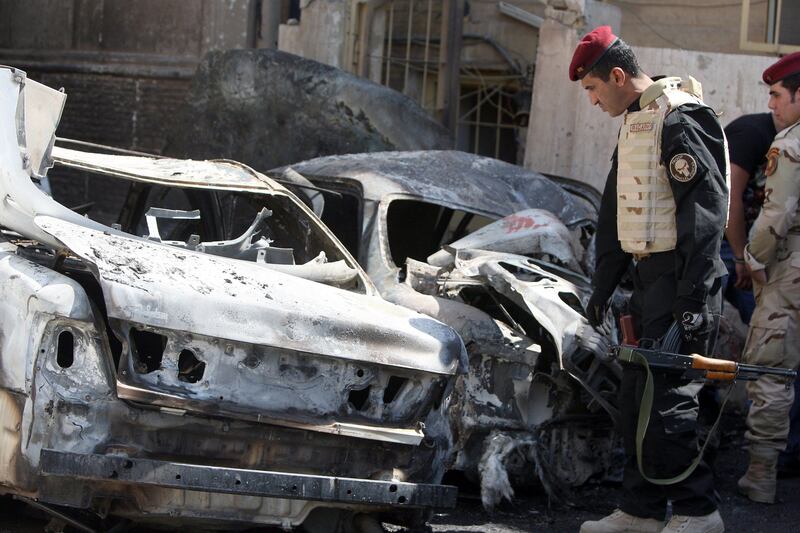BAGHDAD // Gunmen wearing military uniforms over explosives belts held a local Iraqi government cente hostage yesterday in a grisly siege that ended with the deaths of at least 56 people, including three councilmen who were executed with gunshots to the head.
The five-hour standoff in Tikrit, the former dictator Saddam Hussein's home town, ended only when the attackers blew themselves up in one of the bloodiest days in Iraqi this year.
First they set fire to the bodies of the three slain Salahuddin province councilmen in a brutal, defiant show of how insurgents still render Iraq unstable, even if it has so far escaped the political unrest rolling across the Arab world.
"Why did they shoot him and set fire to his poor body?" said the Salahuddin government spokesman, Mohammed al Asi, trying not to weep when confirming the killing of Mehdi al Aaran, an elderly man who headed the council's religious affairs committee.
Salahuddin's governor, Ahmed Abdullah, speaking in a muted voice, called the attack "a tragic incident carried out by ruthless terrorists."
Iraqi officials were quick to blame al Qa'eda in Iraq for the slaughter, noting that executions and suicide bombers are hallmarks of the extremist group. A senior intelligence official in Baghdad likened the attack to al Qa'eda's horrifying hostage raid last fall on a Catholic church in Baghdad that left 68 dead and stunned the nation.
Yesterday's attack left 56 victims dead and 98 wounded, including government workers, security forces and bystanders, said the Salahuddin health director, Dr. Raied Ibrahim. Many died in the volleys of gunfire and explosions.
Among the dead were councilman Abdullah Jebara, a vocal al Qa'eda foe; the council's health committee chairman, Wathiq al Samaraie; and Iraqi journalist Sabah al Bazi, a correspondent for Al Arabiya satellite TV channel and a freelancer for CNN and Reuters.
Members of Iraq's parliament immediately called for an investigation into how the band of eight or nine insurgents could pull off the attack and paralyse a mostly Sunni Muslim city that was once a hotbed for al Qa'eda in Iraq and Saddam sympathisers. Tikrit is the capital of Salahuddin and is located 130 kilometres north of Baghdad.
Officials are particularly sensitive about the ability of Iraqi security forces to protect the country as U. troops plan to leave at the end of the year.
"We denounce this sorrowful act, where insurgents with military uniforms could break into the council building," said parliamentarian Suhad al Obedi, who represents Salahuddin province. "This is a security breach."
It is not hard to buy uniforms on Iraqi streets, and the ease and deadliness of the attack demonstrated sophisticated planning by the gunmen.
A car bomb exploded outside the Salahuddin provincial council headquarters around 1 pm, distracting security officials who rushed to put out the resulting fire. That is when the uniformed gunmen, including one with counterfeit high rank, identified themselves as Iraqi soldiers at a security checkpoint outside the compound. Told they would have to be searched before entering, they opened fire on guards and stormed the building.
"The gunmen were armed with grenades and began their raid by firing at random at a reception room," said Ali Abdul Rihman, a spokesman for the governor. "Then they opened fire inside."
The provincial council meets at the headquarters every Tuesday, but Mr Rihman said local politicians ended their discussion early because there was little on their agenda. As a result, he said, most of the politicians had already left the headquarters when the assault began.
Mr al Asi, the provincial spokesman, said 15 people were taken hostage on the headquarters' second floor, where the gunmen hurled grenades and fired at security forces below. The hostages, including the three politicians, were each shot in the head, Mr al Asi said.
Parliament member Qutayba al Jabouri said security forces did not try to negotiate with the gunmen, since they were under assault. Governor Abdullah described a fierce shootout between the gunmen and Iraqi security forces who surrounded the building.
American troops who were nearby as part of an advising mission with Iraqi forces also responded to the attack, and some US soldiers received minor wounds, said military spokesman Colonel Barry Johnson. The US troops dropped back after Iraqi forces took control, Colonel Johnson said.
The looming deadline for the US troops' withdrawal, twinned with the political unrest cascading throughout the Mideast, has spooked American and Iraqi leaders alike about whether the fledgling Iraqi democracy will fall back into violence.
A Baghdad University political analyst, Hassan Kamil, called yesterday's attacks "another indication that the insurgents are no way thinking of giving up the struggle in Iraq."
"It is a show of force aiming at convincing people that despite the setbacks, the insurgency is still active," Mr Kamil said. "Security is still fragile."





